易错英语口语翻译
历年中考英语交际口语易错题集

历年中考英语交际口语易错题集1. —Don’t make any noise in the living room! My baby is sleeping.—_______.A. Sorry, I won’tB. It doesn’t matterC. Excuse me, I’m wrongD. Certainly, I won’t【解析】此题容易误选 C 或 D。
一方面可能由于不知道 Excuse me. 与Sorry. 的区别,而误选为C;另一方面可能由于不理解这一语境而误选为D。
这里听话者是做错了事情,做错的事情首先应该说 Sorry 表示歉意,然后现表示不会再那样做了。
正确答案为A。
2. —I haven’t seen Jack for three days, is he ill?—_______. His mother told me that he was in hospital.A. I am afraid soB. I hope notC. I don’t expectD. I am afraid not【解析】此题容易误选B或D。
一般来说我们不希望别人生病,如果不注意语境的话,就很可能误选为B或D。
由下文His mother told me that he was in hospital. 可知Jack可能生病了。
I am afraid so. 意为“恐怕是这样的”,常用来表示一种不太肯定的语气。
正确答案为A3. —Excuse me. May I use your computer?—_______. It’s broken.A. SureB. Yes, here you areC. With p leasureD. I’m afraid not【解析】此题易犯草率答题的错误而误选A或B。
对于别人的请求大多数要用肯定回答,如果没有下文的It’s broken. 选择A或B那肯定是正确的。
Module 5-6 易错题型:翻译与句型转换-2022-2023学年七年级英语下学期
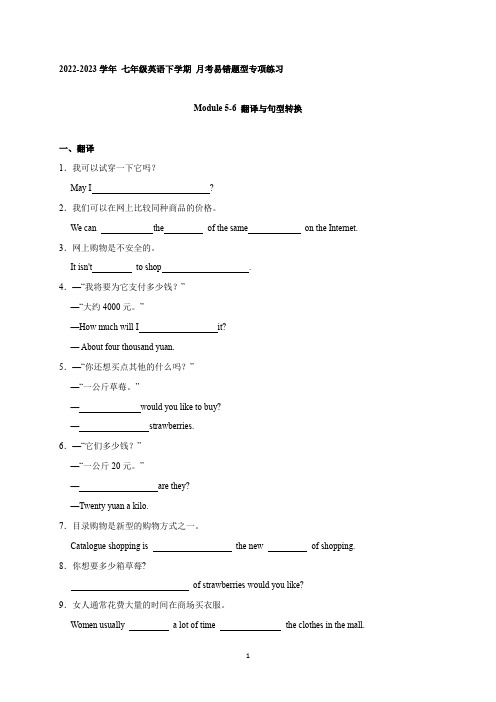
2022-2023学年七年级英语下学期月考易错题型专项练习Module 5-6 翻译与句型转换一、翻译1.我可以试穿一下它吗?May I?2.我们可以在网上比较同种商品的价格。
We can the of the same on the Internet. 3.网上购物是不安全的。
It isn't to shop.4.—“我将要为它支付多少钱?”—“大约4000元。
”—How much will I it?— About four thousand yuan.5.—“你还想买点其他的什么吗?”—“一公斤草莓。
”—would you like to buy?—strawberries.6.—“它们多少钱?”—“一公斤20元。
”—are they?—Twenty yuan a kilo.7.目录购物是新型的购物方式之一。
Catalogue shopping is the new of shopping. 8.你想要多少箱草莓?of strawberries would you like?9.女人通常花费大量的时间在商场买衣服。
Women usually a lot of time the clothes in the mall.10.露西, 你还想要其他什么东西?would you like, Lucy?11.买这些衣服你如何付钱?How do you the clothes?12.我们可以在网上买所有东西。
We can buy everything .13.香蕉多少钱?are the bananas?14.今天苹果半价销售。
The apples are today.15.他们喜欢什么颜色?do they like?16.过马路时要小心。
Be careful when you the street.17.I get there?我怎样到那里呢?18. a bookshop near here?这儿附近有书店吗?19.劳驾,请问到博物馆怎么走?Excuse me.Could you tell me to the museum?20.游客可以乘地铁到奥林匹克运动中心。
中考英语78个易混易错单词+短语+句型(全)
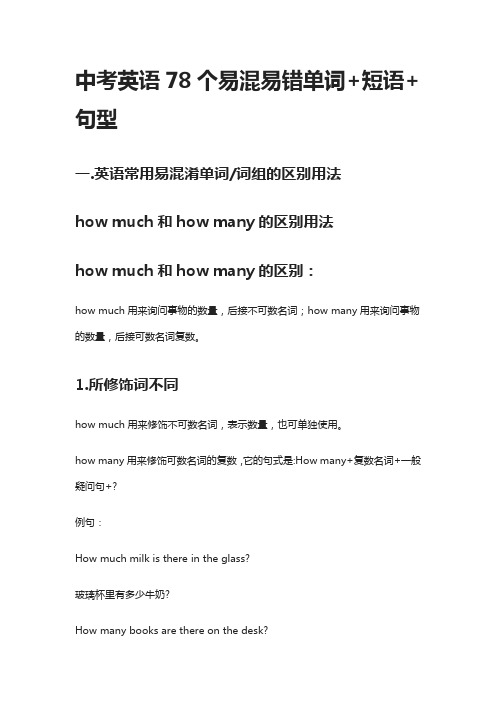
中考英语78个易混易错单词+短语+句型一.英语常用易混淆单词/词组的区别用法how much和how many的区别用法how much和how many的区别:how much用来询问事物的数量,后接不可数名词;how many用来询问事物的数量,后接可数名词复数。
1.所修饰词不同how much用来修饰不可数名词,表示数量,也可单独使用。
how many用来修饰可数名词的复数,它的句式是:How many+复数名词+一般疑问句+?例句:How much milk is there in the glass?玻璃杯里有多少牛奶?How many books are there on the desk?有多少本书在桌子上?2.用法不同How much 表示多少钱,用来问价格。
例句:How much is this dress?这个连衣裙多少钱?How many 表示多少,用来问数量。
例句:How many apples do you have?你有多少苹果?in和on的区别用法:当我们表示某些东西被其他东西所包围时使用“in”这个词。
而“on”用于描述物体被放置在其他物体上方或外部的情况。
in可表时间,表地点,表手段、方法、材料。
on表示时间、地点、方位等。
1.意思不同in:prep.在 ... 里;在 ... 地方;在 ... 期间on:prep.在 ... 之上2.用法不同in:in着重一段时间的过程,常用于重复动作或延续动作。
in表示从现在时间算起推移到将来的一段时间之后,一般与将来时态连用。
He is a layman in economics.他对经济学一窍不通。
on:表示“在物体的表面上”,只能用on的表达方式有on the next morning,on the following。
The spider is walking on the ceiling.蜘蛛在天花板上爬行。
3.侧重点不同in:表示“在其中”。
三年级英语口语易错题30题
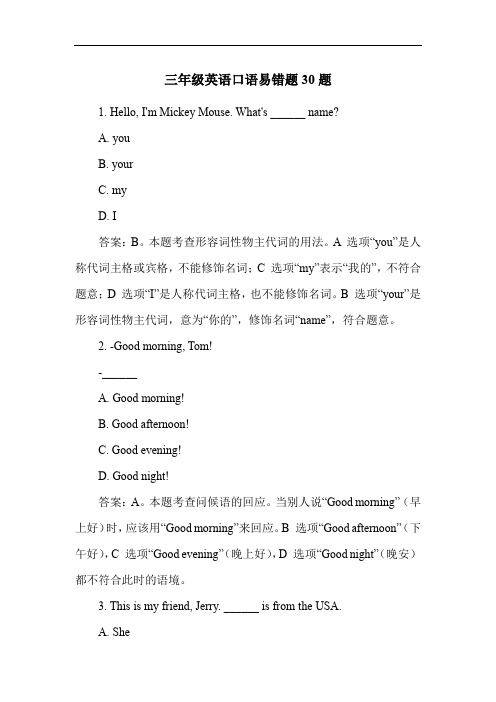
三年级英语口语易错题30题1. Hello, I'm Mickey Mouse. What's ______ name?A. youB. yourC. myD. I答案:B。
本题考查形容词性物主代词的用法。
A 选项“you”是人称代词主格或宾格,不能修饰名词;C 选项“my”表示“我的”,不符合题意;D 选项“I”是人称代词主格,也不能修饰名词。
B 选项“your”是形容词性物主代词,意为“你的”,修饰名词“name”,符合题意。
2. -Good morning, Tom!-______A. Good morning!B. Good afternoon!C. Good evening!D. Good night!答案:A。
本题考查问候语的回应。
当别人说“Good morning”( 早上好)时,应该用“Good morning”来回应。
B 选项“Good afternoon”( 下午好),C 选项“Good evening”( 晚上好),D 选项“Good night”( 晚安)都不符合此时的语境。
3. This is my friend, Jerry. ______ is from the USA.A. SheB. HeC. ItD. They答案:B。
本题考查人称代词的用法。
根据“Jerry”这个名字,可知是男性,A 选项“She”表示女性;C 选项“It”通常用于指代物;D 选项“They”表示复数,都不符合。
B 选项“He”表示男性,符合题意。
4. -Nice to meet you.-______A. How are you?B. I'm fine, thank you.C. Nice to meet you, too.D. Thank you.答案:C。
本题考查日常交际用语。
当别人说“Nice to meet you” 很高兴见到你)时,应该用“Nice to meet you, too” 我也很高兴见到你)来回应。
一到六年级所有英语易错单词
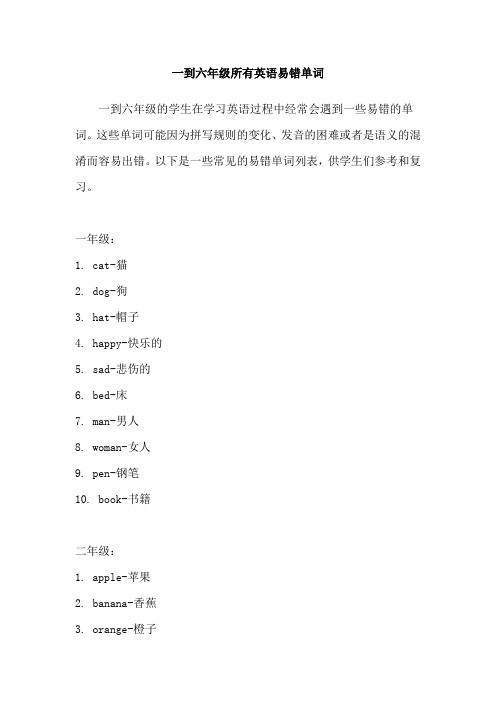
一到六年级所有英语易错单词一到六年级的学生在学习英语过程中经常会遇到一些易错的单词。
这些单词可能因为拼写规则的变化、发音的困难或者是语义的混淆而容易出错。
以下是一些常见的易错单词列表,供学生们参考和复习。
一年级:1. cat-猫2. dog-狗3. hat-帽子4. happy-快乐的5. sad-悲伤的6. bed-床7. man-男人8. woman-女人9. pen-钢笔10. book-书籍二年级:1. apple-苹果2. banana-香蕉3. orange-橙子4. teacher-老师5. student-学生6. car-汽车7. bike-自行车8. home-家9. school-学校10. park-公园三年级:1. elephant-大象2. giraffe-长颈鹿3. lion-狮子4. tiger-老虎5. monkey-猴子6. bird-鸟7. fish-鱼8. panda-熊猫9. rabbit-兔子10. turtle-乌龟四年级:1. computer-电脑2. phone-电话3. table-桌子4. chair-椅子5. pencil-铅笔6. ruler-尺子7. eraser-橡皮擦8. map-地图9. globe-地球仪10. clock-时钟五年级:1. country-国家2. city-城市3. river-河流4. mountain-山5. ocean-海洋6. forest-森林7. desert-沙漠8. island-岛屿9. volcano-火山10. waterfall-瀑布六年级:1. understand-理解2. difficult-困难的3. interesting-有趣的4. favorite-最喜欢的5. different-不同的6. important-重要的7. beautiful-美丽的8. comfortable-舒适的9. dangerous-危险的10. successful-成功的这些单词是学生们在学习英语过程中容易出错的一些例子。
英语翻译易犯错误的50个例子

翻译易错的50个例子1. cabinet photograph例句:Is the cabinet photograph well taken?误译:这张全体内阁成员的合影拍得好吗?原意:这张六英寸照片拍得好吗?说明:cabinet photograph (合成名词) 是"六英寸照片"之意。
2. cakes and ale例句:She fully enjoyed cakes and ale。
误译:她充分地享用了蛋糕和啤酒。
原意:她尽享了人生乐趣。
说明:cakes and ale 意为"人生乐趣(事)". (此语出自莎士比亚著作Twelfth Night<<第十二夜>>)。
3. call例句:He has no call to flare up。
误译:他没有发怒大叫。
原意:他没有必要发怒。
说明:本例的call (名词),意为"必要","理由". 作此解时一般用于否定句和疑问句。
4. call one names例句:My grandpa told me not to call him names。
误译:我爷爷告诉我不要叫他的名字。
原意:我爷爷叫我不要骂他。
说明:call one names 意为"辱骂某人",用于口语. 值得注意的是,one一定要用宾格,而不是所有格,即不是one's."names" 一定是复数"names", 否则就不是此意. 如上例,若该成Mygrandpa told me notto callhis name. 则是"我爷爷叫我不要叫他的名字". call one's name中的name根据情况,可用单数和复数。
5. can例句:Buy up all the pineapples! We can can them。
2020年中考英语易错易丢分专题15情景交际含解析
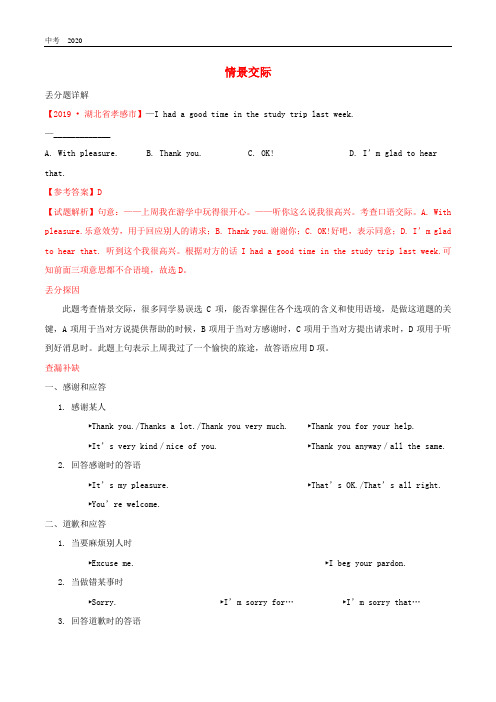
情景交际丢分题详解【2019 • 湖北省孝感市】—I had a good time in the study trip last week.—_____________A. With pleasure.B. Thank you.C. OK!D. I’m glad to hear that.【参考答案】D【试题解析】句意:——上周我在游学中玩得很开心。
——听你这么说我很高兴。
考查口语交际。
A. With pleasure.乐意效劳,用于回应别人的请求;B. Thank you.谢谢你;C. OK!好吧,表示同意;D. I’m glad to hear that. 听到这个我很高兴。
根据对方的话I had a good time in the study trip last week.可知前面三项意思都不合语境,故选D。
丢分探因此题考查情景交际,很多同学易误选C项,能否掌握住各个选项的含义和使用语境,是做这道题的关键,A项用于当对方说提供帮助的时候,B项用于当对方感谢时,C项用于当对方提出请求时,D项用于听到好消息时。
此题上句表示上周我过了一个愉快的旅途,故答语应用D项。
查漏补缺一、感谢和应答1. 感谢某人►Thank you./Thanks a lot./Thank you very much. ►Thank you for your help.►It’s very kind/nice of you. ►Thank you anyway/all the same.2. 回答感谢时的答语►It’s my pleasure. ►That’s OK./That’s all right.►You’re welcome.二、道歉和应答1. 当要麻烦别人时►Excuse me. ►I beg your pardon.2. 当做错某事时►Sorry. ►I’m sorry for…►I’m sorry that…3. 回答道歉时的答语►That’s all right. ►That’s OK. ►Never mind.►It’s nothing. ►It doesn’t matter.三、邀请和应答1. 表示邀请的用语►Will you come to…? ►Would you like to…?►May I invite you to…? ►How/What about…?2. 接受邀请时的答语►Yes, I’d like /love to. ►Yes. It’s very kind of you.►That would be nice.3. 拒绝邀请时的答语►No, thank you. ►I’d love /like to, but…四、请求和应答1. 表请求用语►May I…? ►Can/Could I…? ►Wo uld you mind if…?2. 表肯定的答语►Sure. /Certainly. ►Yes, do please.►That’s all right. ►Of course, you can.3. 表否定的答语►I’m afraid not. ►I’m sorry, but you mustn’t/can’t.►You’d better not.五、祝愿、祝贺和应答1. 祝贺用语►Have a good day/time! ►Have a good journey/trip!►Good luck! ►Enjoy yourself!►Best wishes to you! ►Happy New Year!►Merry Christmas! ►Happy birthday!►Congratulations! ►Well done!2. 应答用语►Thank you. ►You, too. ►The same to you. 六、提供帮助和应答1. 提供帮助►Can I help you? ►Would you like me to help you?►What can I do for you? ►Let me help you.2. 肯定答语►Yes, please./Yes, thanks. ►Thank you for your help.►Thank you. ►That would be nice.3. 否定答语►No, thanks/thank you. ►That’s very kind/nice of you, but I can manage itmyself.七、劝告和建议►You’d better…►Why not…?►How/What about…? ►Shall we…? ►You shouldn’t…八、打电话1. 拨电话方的交际用语►Could/May/Can I speak to...please? ►Who’s that(speaking)?►This is…(speaking). ►Could you ask him/her to call me back?►I’m calli ng to tell/ask you to…2. 接电话方的交际用语►Hold on(for a moment), please.►I’m sorry/afraid he’s/she’s out at the moment/right now.►Can I take a message (for you)?九、购物1. 营业员常用的交际用语►CanI help you?/What can I do for you? ►How many/much… do you want?►What about this one? ►What colour/size/kind do you like/want?►I’m afraid we haven’t got any…in that size at the moment.►Here you are.2. 顾客常用的交际用语►I want /would like to buy some. . . (for. . . ) ►I’m looking for. . .►I would like/want two kilos of... ►I like the colour,but it’s/they’retoo. . .►It’s great, but it’s not. . . enough. ►Have you got any otherkind/colour/size?►That looks nice/great. ►Have you got anything cheaper?►How much does it cost? ►Can/May I try them/it on,please?十、看病1. 医生常用交际用语►What’s wrong with you? /What’s tihe matter?/What’s up?►How long have you been like this? ►Have you taken your temperature?►Have you had anything to eat this morning?►There’s nothing serious.►Take this medicine and stay in bed for a few days.►You will get better soon. ►You will be all right/well soon.2. 病人常用的交际用语►I have got a headache/cough.►I’m not feeling well./l don’t feel very well./I feel terrible►There’s something wrong with...十一、情感1. 高兴►How wonderful/nice! ►That’s lovely/great/wonderful!►I’m pleased to know that.2. 惊奇►Really? ►Oh dear!►Is that so? ►What a surprise!►How nice to see you! ►How surprising!►I’m surprised.3. 满意►Good! ►Well done! ►Perfect!►That’s fine. ►That’s better. ►That’s good enough.4. 忧虑►What’s wrong? ►What’s the matter?►Anything wrong? ►What should we do?5. 遗憾与同情►I’m so sorry! ►It’s a great pity!►What a shame/pity! ►That’s too bad! ►I’m sorry tohear that.中考题演练1. 【2019 • 江苏省泰州中考】—Sorry, Mrs Smith. I am late.—_____________. Please go to your seat.A. All rightB. With pleasureC. That’s OKD. You’re welcome【答案】C【解析】句意:——对不起,史密斯太太。
情景交际易错易混点

情景交际易错易混点一、单项选择情景交际1. ------ I'm going to Paris next week.----- ------------------ ! So am IA. Wish you good luckB. What a coincidenceC. Don't mention itD. Good trip【答案】B【解析】【详解】考查情景交际。
句意:一一我下周要去巴黎。
一一太巧了!我也要去。
A. Wish you good luck"祝你好运";B. What a coincidence“巧合,一致”;C. Don't mention it"不要客气”;D. Good trip 好旅行。
两个人不约而同,要去同一个地方,所以这是一种‘巧合〃。
故选B。
2.—Wow! You look funny in that sweater.— My grandmother gave it to me for Christmas. You know,.A. each bird loves to hear himself singB. beauty is in the eye of the beholderC. it is the thought that countsD. the outsider sees the most of the game【答案】C【解析】【详解】考查谚语。
一一哇!你穿那件毛衣看起来很滑稽。
一一我奶奶送给我的圣诞礼物。
你知道,礼轻情意重,更重要的是心意。
A. each bird loves to hear himself sing孤芳自赏B.beauty is in the eye of the beholder 情人眼里出西施 C. it is the thought that counts礼轻情意重,更重要的是心意D. the outsider sees the most of the game旁观者清。
2023届高考英语语法知识:易错动词用法归纳11讲义
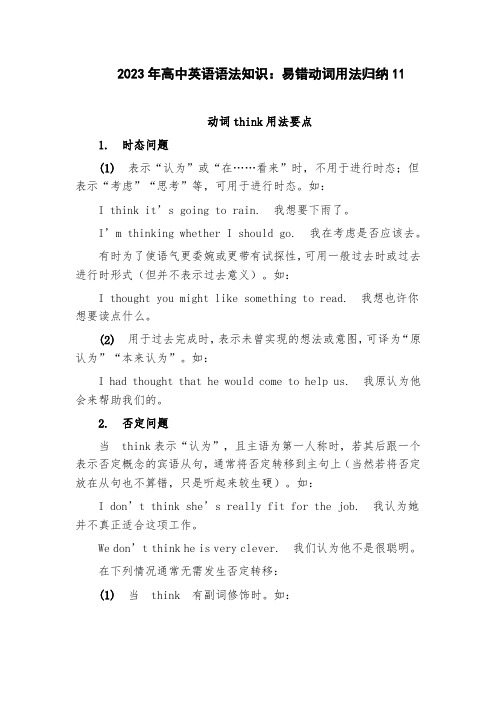
2023年高中英语语法知识:易错动词用法归纳11动词think用法要点1. 时态问题(1) 表示“认为”或“在……看来”时,不用于进行时态;但表示“考虑”“思考”等,可用于进行时态。
如:I think it’s going to rain. 我想要下雨了。
I’m thinking whether I should go. 我在考虑是否应该去。
有时为了使语气更委婉或更带有试探性,可用一般过去时或过去进行时形式(但并不表示过去意义)。
如:I thought you might like something to read. 我想也许你想要读点什么。
(2) 用于过去完成时,表示未曾实现的想法或意图,可译为“原认为”“本来认为”。
如:I had thought that he would come to help us. 我原认为他会来帮助我们的。
2. 否定问题当think表示“认为”,且主语为第一人称时,若其后跟一个表示否定概念的宾语从句,通常将否定转移到主句上(当然若将否定放在从句也不算错,只是听起来较生硬)。
如:I don’t think she’s really fit for the job. 我认为她并不真正适合这项工作。
We don’t think he is very clever. 我们认为他不是很聪明。
在下列情况通常无需发生否定转移:(1) 当think 有副词修饰时。
如:I really think that he will not help us. 我的确认为他不会帮我们。
(2) 当think 前有表示强调的助动词do 时。
如:I do think that you are not right. 我的确认为是你不对。
(3) 当think 不是以一般现在时形式出现时(如是一般过去时、过去进行时、过去完成时等)。
如:I thought you hadn’t read it. 我认为你没有读它呢。
雅思考试中的易错词
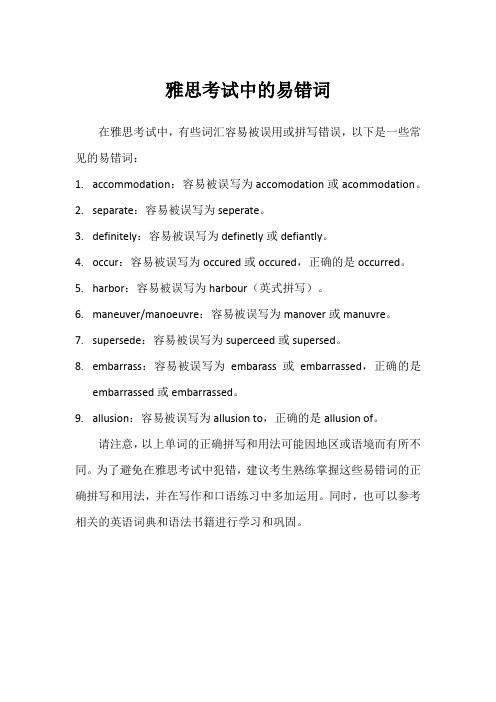
雅思考试中的易错词
在雅思考试中,有些词汇容易被误用或拼写错误,以下是一些常见的易错词:
1.accommodation:容易被误写为accomodation或acommodation。
2.separate:容易被误写为seperate。
3.definitely:容易被误写为definetly或defiantly。
4.occur:容易被误写为occured或occured,正确的是occurred。
5.harbor:容易被误写为harbour(英式拼写)。
6.maneuver/manoeuvre:容易被误写为manover或manuvre。
7.supersede:容易被误写为superceed或supersed。
8.embarrass:容易被误写为embarass或embarrassed,正确的是
embarrassed或embarrassed。
9.allusion:容易被误写为allusion to,正确的是allusion of。
请注意,以上单词的正确拼写和用法可能因地区或语境而有所不同。
为了避免在雅思考试中犯错,建议考生熟练掌握这些易错词的正确拼写和用法,并在写作和口语练习中多加运用。
同时,也可以参考相关的英语词典和语法书籍进行学习和巩固。
英语翻译易错语句

1. Nobody will be the wiser.谁也不会更为聪明。
(误)谁也不懂得。
(正)注:英语形容词wise 有三个基本意思:(1) 聪明的,如You were wise not to go.(你不去是聪明的)。
(2) 饱学的,如He is wise in the law.(他精通法律)。
(3)知道的,如We are none the wiser for his explanations.(听完他的解释,我们还是不明白)。
上例便是第三义,等于说Nobody will know it. 通常比较级,意为“至今不知道的事,现在知道了”,所谓none the wiser= no wiser than before= as wise as before,照旧。
2.Don't you see the writing on the wall?你看不见墙上的字吗?(误)难道你看不到灾难的迫切吗?(正)注:The writing on the wall (or sometimes 'handwriting on the wall') is an expression that suggests a portent of doom or misfortune. It originates in the Biblical book of Daniel - where supernatural writing fortells the demise of the Babylonian Empire, but it has come to have a wide usage in language and literature.3.Truth lies at the bottom of the decanter.真相从玻璃酒瓶地下看出来。
(误)酒后吐真言。
(正)4.Don't tell him home truths.不要告诉他家里的真相。
八年级下册英语单词重点易错
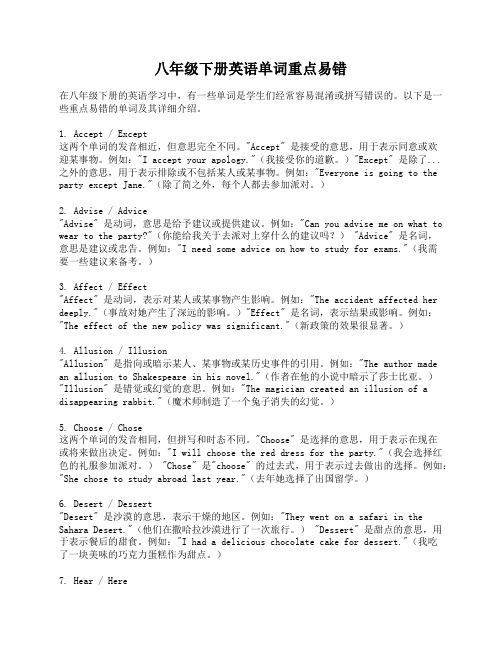
八年级下册英语单词重点易错在八年级下册的英语学习中,有一些单词是学生们经常容易混淆或拼写错误的。
以下是一些重点易错的单词及其详细介绍。
1. Accept / Except这两个单词的发音相近,但意思完全不同。
"Accept" 是接受的意思,用于表示同意或欢迎某事物。
例如:"I accept your apology."(我接受你的道歉。
)"Except" 是除了...之外的意思,用于表示排除或不包括某人或某事物。
例如:"Everyone is going to the party except Jane."(除了简之外,每个人都去参加派对。
)2. Advise / Advice"Advise" 是动词,意思是给予建议或提供建议。
例如:"Can you advise me on what to wear to the party?"(你能给我关于去派对上穿什么的建议吗?) "Advice" 是名词,意思是建议或忠告。
例如:"I need some advice on how to study for exams."(我需要一些建议来备考。
)3. Affect / Effect"Affect" 是动词,表示对某人或某事物产生影响。
例如:"The accident affected her deeply."(事故对她产生了深远的影响。
)"Effect" 是名词,表示结果或影响。
例如:"The effect of the new policy was significant."(新政策的效果很显著。
)4. Allusion / Illusion"Allusion" 是指向或暗示某人、某事物或某历史事件的引用。
2023届高考英语语法知识:易错动词用法归纳16讲义

2023年高中英语语法知识:易错动词用法归纳16动词bear表生育时的语法与用法bear 表“生育”时,它的过去分词有两种形式,即born和borne。
两者的区别是:强调“出生”时,用born,主要用于be born 这一结构;强调动作意义的“生育”时,用borne。
如:She was born in the fifties. 她生于50年代。
His wife has borne (him) three children. 他妻子(给他)生了3个孩子。
在现代英语中,表示“生育”的borne通常不用于被动语态,尽管原来可说He was borne by an English woman. 但现在一般会说成:He was born to an English woman. 他是一个英国妇女生的。
有人认为,表示“出生”意义的be born只能用过去式,其实也不一定。
如:Everyone is born equal. 人生来是平等的。
A woman is pregnant for nine months before a child is born. 在小孩生出前,妇女要怀孕9个月。
注意以下各例表示“出生”时后接的介词:He was born to [of] wealthy parents. 他出身于有钱人家。
He was born into [to, of] a wealthy (noble) family. 他生于富裕人家(名门望族)。
注意,类似以下用法中的介词to不可换成by:babies who are born to very young mothers 年轻小妈妈生的孩子Two children were born to them. 他们生了两个孩子。
He was born to a shoemaker’s wife in a small cottage. 他出生于一所小村舍,母亲是鞋匠的妻子。
历届中考英语易错、陷阱题精编训练(口语交际)

历届中考英语易错、陷阱题精编训练(口语交际)1. “Could you do me a favour and take the box up to the six floor?”“_______.”A. With pleasureB. My pleasureC. No wonderD. No comment2. “It’s $500, but that is my last offer.”“OK, it is a ________.”A. costB. priceC. rewardD. deal3. “I hear Johnson was badly injured in the accident.”“_______ let’s go and see him.”A. What’s moreB. If soC. Where possibleD. When necessary4. “Will you go skiing with me this winter vacation?”“It ______.”A. all dependB. all dependsC. is all dependedD. is all depending5. “Do you want to go to the movie, Jane?”“______. I feel like doing something different.”A. Don’t mention itB. I don’t want itC. I don’t think soD. Not really6. “Would you like me to show you the way?”“_______.”A. That’s very kind of you.B. Yes, you could.C. Good idea!D. With great pleasure!7. “I prefer a computer made in your company, but I may need some more information about the product.”“_______.”A. Thank youB. It’s a pleasureC. You are welcomeD. At your service8. “Have a drink?”“No thanks, _____.”A. I do mindB. I don’t like itC. Never mindD. I’d rather not9. “We’ve missed the train!”“_____, there’ll be another in ten minutes.”A. All rightB. Not at allC. Never mindD. Don’t mention it10. “Would you mind telling her the news?”“_____, but I don’t know if I _____ her these days.”A. Of course, shall seeB. Of course not, seeC. Of course, seeD. Of course not, shall see11. “May I borrow your paper?”“______.”A. By all meansB. Never mindC. You are welcomeD. Don’t mention it12. He pushed his way through the crowd, saying “_____.”A. Never mindB. With pleasureC. Go aheadD. Excuse me13. “Here’s what you asked for.”“______.”A. Many thanksB. Thank a lotC. Thanks youD. Thank you a lot14. “Can you spare me a few minutes now?”“______, but I’ll be free this afternoon.”A. No, I won’tB. Yes, with pleasureC. I’m not sureD. I’m afraid not15. “Would you like to turn that music down? I’m writing a letter.”“_____.”A. No, I’d like toB. No, pleaseC. Yes, sorry.D. Yes, I’d like it.16. “You must find such long hours very tiring.”“______. I enjoyed it.”A. After allB. Never mindC. Not in the leastD. That’s all right17. “Would you take this along to the office for me?”“_____.”A. That’s rightB. With pleasureC. Never mindD. Not at all18. “Do you need any help with those heavy bags?”“No, thanks; _____.”A. Never mindB. All rightC. I can manageD. You are welcome19. “Mr Smith is a kind person. I like to to work with him.”“In fact, everyone _______.”A. isB. doesC. hasD. likes20. “At lunch time I’d like to have a chat with you.”“Pardon, Have _____ with me?”A. whenB. whoC. whichD. what21. “I think you should phone Jenny and say sorry to her.”“______. It was her fault.”A. No wayB. Not possibleC. No chanceD. Not at all【答案与解析】1. 选A。
(完整版)英语翻译易错语句
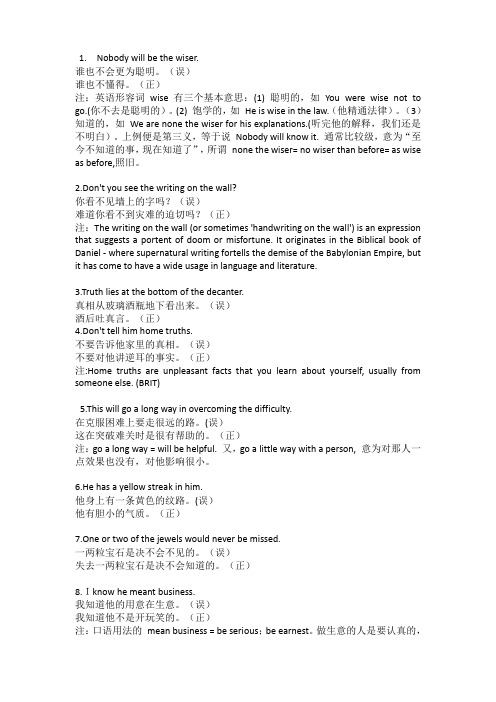
1. Nobody will be the wiser.谁也不会更为聪明。
(误)谁也不懂得。
(正)注:英语形容词wise 有三个基本意思:(1) 聪明的,如You were wise not to go.(你不去是聪明的)。
(2) 饱学的,如He is wise in the law.(他精通法律)。
(3)知道的,如We are none the wiser for his explanations.(听完他的解释,我们还是不明白)。
上例便是第三义,等于说Nobody will know it. 通常比较级,意为“至今不知道的事,现在知道了”,所谓none the wiser= no wiser than before= as wise as before,照旧。
2.Don't you see the writing on the wall?你看不见墙上的字吗?(误)难道你看不到灾难的迫切吗?(正)注:The writing on the wall (or sometimes 'handwriting on the wall') is an expression that suggests a portent of doom or misfortune. It originates in the Biblical book of Daniel - where supernatural writing fortells the demise of the Babylonian Empire, but it has come to have a wide usage in language and literature.3.Truth lies at the bottom of the decanter.真相从玻璃酒瓶地下看出来。
(误)酒后吐真言。
(正)4.Don't tell him home truths.不要告诉他家里的真相。
2020届中考英语易错易丢分专题15情景交际(含解析)

? I ’m afraid we haven ’ t got any … in that size at the moment. ? Here you are.
2. 顾客常用的交际用语
? I want /would like to buy some. . . (for. . . ) ? I would like/want two kilos of...
? You’ d better … ?How/What about …? 八、打电话
?Why not … ? ?Shall we …?
? You shouldn ’ t …
1. 拨电话方的交际用语
? Could/May/Can I speak to...please? ?This is … (speaking).
【试题解析】句意: —— 上周我在游学中玩得很开心。 —— 听你这么说我很高兴。考查口语交际。 A. With
pleasure.乐意效劳,用于回应别人的请求; B. Thank you. 谢谢你; C. OK! 好吧,表示同意; D. I ’m glad to hear
that. 听到这个我很高兴。根据对方的话 语境,故选 D。
I had a good time in the study trip last week. 可知前面三项意思都不合
丢分探因
此题考查情景交际,很多同学易误选 C 项,能否掌握住各个选项的含义和使用语境,是做这道题的关
键, A 项用于当对方说提供帮助的时候, B 项用于当对方感谢时, C 项用于当对方提出请求时, D 项用于听
? There’s something wrong with... 十一、情感
1. 高兴 ? How wonderful / nice!
初中英语常见易错题解析

中考典型易错题举例分析1. It is _______ outside. Let’s put on our raincoats and go out, Tom.A. coldB. hotC. sunnyD. rainy【解析】此题易误为A。
因为这里有个put on短语,如果不注意raincoats这个词那就很可能草率地选择A。
raincoats是“雨衣”的意思,而不是一般的衣服,那么不是因为外面“冷”,而是因为“下雨”才穿“雨衣”。
正确答案为D。
2. —_______ do you _______ about spring?—The flowers and the green trees.A. How, likeB. How, thinkC. What, thinkD. What, like【解析】此题陷阱选项为A或B或C。
这是由于忽略语境造成的。
由答语The flowers and the green trees. 可知,所问的是“你喜欢春天的什么?”而不是“你觉得春天怎么样?”。
正确答案为D。
3. —What’s your sister like?—_______.A. She is a workerB. She likes pearsC. She is very thinD. She is like her father【解析】此题陷阱选项为B或D。
有很多考生一看题干中的like一词就会想当然地选择B或D。
其实,问句的意思是“你姐姐长得怎么样?”因此,正确答案为C。
What’s … like? 这个句型常常用来询问某人的长相或某事的情况(包括天气情况)。
4. —It’s too hot. Would you mind _______ the door?—_______. Please do it now.A. to open, OKB. opening, Certainly notC. opening, Of courseD. to open, Good idea【解析】此题陷阱选项为A。
2019外研版高中英语必修一Unit4 易错点

Unit4 易错点●seem; appear【教材原句】When life seems like one long night, and nothing is ever going right, there’s just one sure delight: Friendship, like sunrise, warm and bright. (教材P37)On social media sites, people tend to post only positive updates that make them appear happy and friendly. (教材P39)When she first came to my school, she seemed lonely, but we soon became friends. (教材P41)【辨析】两者都有“看起来(好像、似乎…)”的意思,一般可以换用,但在个别殊结构用上的用法上有一定的区别。
seem侧重指根据某种迹象作出的推断,也不一定是事实,常用于以下机构中:①seem + n/adj. 似乎/好像….②seem to be/to do sth. 好像是/做某事③it seems that从句好像….④seem like…..看起来像….⑤it seems as if/though…..看起来好像…….⑥there seem to be….好像有…..温馨提示:①在seem like….和it seems as if/though…..结构中,一般不能换成appear②appear 表示“出现”时,不可与seem 换用appear强调自身表现出, 流露出;appear 指外表给人的印象,可能是真象也可能是假象,不确定性更大一些,常用于以下结构或词组中:① appear + n/adj. 似乎/好像…..② appear to be/to do sth. 好像是/做某事③ it appears that从句好像….④what appears to be…看起来像….的东西⑤there appears to be…. 似乎/好像有……⑥ appear out of nowhere 突然冒出来⑦ appear overnight 一夜之间出现(反义:disappear overnight)One day a stranger appeared on my doorstep.一天,一个陌生人出现在我家门前。
- 1、下载文档前请自行甄别文档内容的完整性,平台不提供额外的编辑、内容补充、找答案等附加服务。
- 2、"仅部分预览"的文档,不可在线预览部分如存在完整性等问题,可反馈申请退款(可完整预览的文档不适用该条件!)。
- 3、如文档侵犯您的权益,请联系客服反馈,我们会尽快为您处理(人工客服工作时间:9:00-18:30)。
1.Do you have a family?
正确译文:你有孩子吗?
2.It's a good father that knows his son。
就算是最好的父亲,也未必了解自己的儿子。
3.I have no opinion of that sort of man。
我对这类人很反感。
4.She put 5 dollars into my hand,"you have been a great man today."
她把5美圆塞到我手上说:"你今天表现得很好."
5.I was the youngest son, and the youngest but two。
我是最小的儿子,但是我还有两个妹妹。
6.The picture flattered her。
她比较上照。
7.The country not agreeing with her, she returned to England。
她杂那个国家水土不服,所以回到了英国。
8. He is a walking skeleton。
他很瘦。
9.The machine is in repair。
机器已经修好了。
10.He allowed the father to be overruled by the judge, and declared his own son guilty。
他让法官的职责战胜了父子的亲情,最终宣布儿子有罪。
11.You don't know what you are talking about。
你在胡说八道。
12.You don't begin to understand what they mean。
你根本不知道他们在干嘛. don't begin :决不
13.They didn't praise him slightly。
他们大大地表扬了他。
14.That's all I want to hear。
我已经听够了。
15.I wish I could bring you to see my point。
你要我怎么说你才能明白呢。
16.You really flatter me。
你让我受宠若惊。
17.He made a great difference。
有他没他结果完全不一样。
18.You cannot give him too much money。
你给他再多的钱也不算多。
19.The long exhausting trip proved too much。
这次旅行矿日持久,我们都累倒了。
20.The monk is only not a dead man。
这个和尚虽然活着,但跟死了差不多。
21.A surgeon made a cut in the patient's stomach。
外科医生在病人胃部打了个洞。
22.You look darker after the holiday。
你看上去更健康了。
23.As luck would have it, he was caught by the teacher again。
不幸的是,他又一次被老师逮个正着。
24.She held the little boy by the right hand。
她抓着小男孩的右手。
(这里"by"与"with"动作主语完全相反。
) 25.Are you there?
等于句型:Do you follow me?
26.If you think he is a good man, think again。
如果你认为他是好人,那你就大错特错了。
27.She has blue eyes。
她长着双蓝眼睛。
28.That took his breath away。
他大惊失色。
29.Two is company but three is none。
两人成伴,三人不欢。
30.The elevator girl reads between passengers。
开电梯的姑娘在没有乘客时看书。
"between"="without":相同用法:She modeled between roles。
译成:她不演戏时去客串下模特。
31.Students are still arriving。
学生还没有到齐。
32.I must not stay here and do nothing。
我不能什么都不做待在这儿。
33.They went away as wise as they came。
译文:他们一无所获。
34.I won’t do it to save my life。
译文:我死也不会做。
35.Nonsense, I don’t think his painting is any better than yours。
译文:胡说,我认为他的画比你好不到哪去。
36.Traditionally, Italian presidents have been seen and not heard。
译文:这个总统有名无权。
37.Better late than the late。
译文:迟到总比丧命好。
38.You don’t want to do that。
译文:你不应该去做。
39.My grandfather is nearly ninety and in his second childhood。
译文:我祖父快90岁了,什么事都需要别人来做。
40.Work once and work twice。
译文:一次得手,再次不愁。
41.Rubber easily gives way to pressure。
译文:橡胶很容易变形。
42.If my mother had known of it she'd have died a second time。
译文:要是我妈妈知道了,她会从棺材里爬起来。
